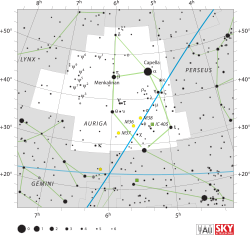Psi7 Aurigae – Wikipedia
| Psi7 Aurigae (ψ7) | |
 | |
| Observationsdata Epok: J2000.0 | |
|---|---|
| Stjärnbild | Kusken |
| Rektascension | 06t 50m 45,94330s[1] |
| Deklination | +48° 47′ 22,1222″[1] |
| Skenbar magnitud () | +5,02[2] |
| Stjärntyp | |
| Spektraltyp | K3 III[3] |
| U–B | +1,35[2] |
| B–V | +1,27[2] |
| Astrometri | |
| Radialhastighet () | +59,53 ± 0,25[4] km/s |
| Egenrörelse (µ) | RA: -25,45[1] mas/år Dek.: -138,19[1] mas/år |
| Parallax () | 8,61 ± 0,22[1] |
| Avstånd | 379 ± 10 lå (116 ± 3 pc) |
| Absolut magnitud () | -0,33[5] |
| Detaljer | |
| Radie | 24[6] R☉ |
| Luminositet | 217[5] L☉ |
| Temperatur | 4 300[7] K |
| Metallicitet | 0,0[7] dex |
| Vinkelhastighet | +10[8] km/s |
| Andra beteckningar | |
| ψ7 Aur, 58 Aurigae, BD+41 1536, FK5 2527, HD 49520, HIP 32844, HR 2516, SAO 41380. [9] | |
Psi7 Aurigae (ψ7 Aurigae, förkortat Psi7 Aur, ψ7 Aur) som är stjärnans Bayerbeteckning, är en ensam stjärna[10] belägen i den östra delen av stjärnbilden Kusken. Den har en skenbar magnitud på 5,02[2] och är svagt synlig för blotta ögat där ljusföroreningar ej förekommer. Baserat på parallaxmätning inom Hipparcosuppdraget på ca 8,6[1] mas, beräknas den befinna sig på ett avstånd på ca 380 ljusår (ca 116 parsek) från solen.
Egenskaper
[redigera | redigera wikitext]Psi7 Aurigae är en orange till röd jättestjärna av spektralklass K3 III[3]. Den har en radie som är ca 24[6] gånger större än solens och utsänder från dess fotosfär ca 217[5] gånger mera energi än solen vid en effektiv temperatur på ca 4 300[7] K. Dess uppmätta vinkeldiameter är, efter korrigering för randfördunkling, 1,96 ± 0,04 mas.[11]
Källor
[redigera | redigera wikitext]- Den här artikeln är helt eller delvis baserad på material från engelskspråkiga Wikipedia, tidigare version.
Referenser
[redigera | redigera wikitext]- ^ [a b c d e f] van Leeuwen, Floor (November 2007), "Validation of the new Hipparcos reduction", Astronomy and Astrophysics, 474 (2): 653–664, arXiv:0708.1752v1 , Bibcode:2007A&A...474..653V, doi:10.1051/0004-6361:20078357. Note: see VizieR catalogue I/311.
- ^ [a b c d] Johnson, H. L.; et al. (1966), "UBVRIJKL photometry of the bright stars", Communications of the Lunar and Planetary Laboratory, 4 (99), Bibcode:1966CoLPL...4...99J
- ^ [a b] Roman, Nancy G. (July 1952), "The Spectra of the Bright Stars of Types F5-K5", Astrophysical Journal, 116: 122, Bibcode:1952ApJ...116..122R, doi:10.1086/145598.
- ^ Famaey, B.; et al. (January 2005), "Local kinematics of K and M giants from CORAVEL/Hipparcos/Tycho-2 data. Revisiting the concept of superclusters", Astronomy and Astrophysics, 430 (1): 165–186, arXiv:astro-ph/0409579 , Bibcode:2005A&A...430..165F, doi:10.1051/0004-6361:20041272.
- ^ [a b c] Anderson, E.; Francis, Ch. (2012), "XHIP: An extended hipparcos compilation", Astronomy Letters, 38 (5): 331, arXiv:1108.4971 , Bibcode:2012AstL...38..331A, doi:10.1134/S1063773712050015.
- ^ [a b] Lang, Kenneth R. (2006), Astrophysical formulae, Astronomy and astrophysics library, 1 (3rd ed.), Birkhäuser, ISBN 3-540-29692-1. The radius (R*) is given by::
- ^ [a b c] McWilliam, Andrew (December 1990), "High-resolution spectroscopic survey of 671 GK giants. I - Stellar atmosphere parameters and abundances", Astrophysical Journal Supplement Series, 74: 1075–1128, Bibcode:1990ApJS...74.1075M, doi:10.1086/191527.
- ^ Bernacca, P. L.; Perinotto, M. (1970), "A catalogue of stellar rotational velocities", Contributi Osservatorio Astronomico di Padova in Asiago, 239 (1), Bibcode:1970CoAsi.239....1B.
- ^ 58 Aur". SIMBAD. Centre de données astronomiques de Strasbourg. Hämtad 2012-08-24.
- ^ Eggleton, P. P.; Tokovinin, A. A. (September 2008), "A catalogue of multiplicity among bright stellar systems", Monthly Notices of the Royal Astronomical Society, 389 (2): 869–879, arXiv:0806.2878 , Bibcode:2008MNRAS.389..869E, doi:10.1111/j.1365-2966.2008.13596.x.
- ^ Richichi, A.; Percheron, I.; Khristoforova, M. (February 2005), "CHARM2: An updated Catalog of High Angular Resolution Measurements", Astronomy and Astrophysics, 431: 773–777, Bibcode:2005A&A...431..773R, doi:10.1051/0004-6361:20042039


 French
French Deutsch
Deutsch




